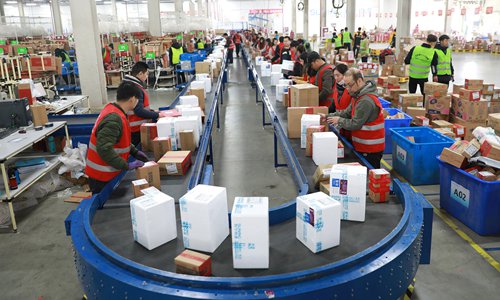
Staff at a logistic warehouse in Shenyang, Northeast China's Liaoning Province work overtime on Friday for China's Double 11 - November 11 - shopping festival. Over 1,000 logistics staffers in the warehouse are working 24 hours to prepare for the online shopping carnival, which brought orders worth 168.2 billion yuan ($ 26.5 billion) in 24 hours last year. Photo: IC
Major Chinese e-commerce platforms have fired their opening salvos for the Singles' Day shopping festival with enticing incentives for both consumers and merchants, as the world's second-largest economy gears up for the annual buying spree.
Traditional retailers remain the backbone of the e-commerce event of the year, but their rivals with expertise in video marketing and social commerce are turning into more "disruptive" forces, analysts said, expecting an industry reshuffle in line with growing demand for life-improving upgrades.
Alibaba Group on Monday kicked off the 14th edition of the November 11 shopping festival.
Featuring upwards of 290,000 brands, this year's festival "will have the most diverse range of products in the event's history, with 17 million products available to over 1 billion annual active consumers on our platforms in China," according to a company statement sent to the Global Times on Monday, citing Chui Xue, president of the Industry Development and Operation Center of Taobao and Tmall at Alibaba Group.
Presales for the November 11 event on Alibaba's business-to-consumer platform Tmall began at 8 pm Beijing time on Monday.
The e-commerce behemoth revealed a raft of measures to incentivize consumers and merchants to jump onto the shopping bandwagon that's slated to reach a crescendo on November 11.
As part of preparations on different fronts in the lead-up to the final sale day, Alibaba's logistics arm Cainiao has plans for the addition of "100,000 short-term staff to its workforce in sorting centers, distribution centers and Cainiao Post stations" to ensure timely and quality doorstep delivery, Alibaba said in a separate statement sent to the Global Times on Monday.
Cainiao has also "reserved additional warehousing facilities of over 4 million square meters in more than 20 cities across China, including 'COVID backup warehouses' to support seven-day emergency storage allocation."
Among the new products to be introduced this November 11 are fashion items and accessories from luxury brands Moncler and Ferrari, which unveiled Tmall flagship stores over the past month.
Merchant-oriented incentives include access to Alibaba's marketing management platform DMP for all merchants on Taobao and Tmall for the first time during the 11.11 period, enabling them to tap into digital intelligence to make better operational decisions.
In the case of Alibaba's rival JD.com, its November 11 campaign focuses on promotions across the board, read a company post on its WeChat account known as JD blackboard bulletin on Monday.
Presales started at 8 pm Thursday on JD.com, where the annual spree will be officially launched at 8 pm on October 31. For each deal amounting to 299 yuan ($41.17) - across categories and merchants - a deduction of 50 yuan will be automatically factored in without having to get coupons in advance, the post said.
JD.com vowed the offering of a price guarantee of 30 days for more than 500 million items. It disclosed plans for enrolling new merchants from 267 industrial clusters across the country, aiming to help the progress of vendors with operations, supply chains and digital transformation.
Other platforms are pivoting toward an incorporation of their physical presence into online capacities.
Over the November 11 period, 48 Suning.com outlets will be newly opened, according to a company statement sent to the Global Times. The stores will feature new experience scenarios such as big-screen home theaters and water purification systems.
In an effort to boost consumption, Suning.com will team up with local governments in Beijing, Shanghai, Shenzhen, Xi'an, Chengdu and other localities, as well as an array of home appliance makers and banks, to provide consumers with green-themed subsidies.
Varying platforms are competing for consumers and merchants amid intensified rivalry during the annual shopping event, Zhang Yi, CEO of iiMedia Research Institute, told the Global Times on Monday.
Alibaba's Tmall and Taobao and JD.com used to be the stars, but the rise of new entrants to the increasingly crowded e-commerce arena has squeezed the traditional forces, Zhang said.
He cited Douyin, which has given rise to a growing number of video marketing accounts, and Xiaohongshu, which is adept at social commerce.
An industry reshuffle is well in the making, according to Zhang, and future rivalries will focus on whoever can get a bigger slice of growing demand for life-improving upgrades among domestic consumers.
A shift toward electric vehicles from fossil fuel cars is an example of such upgrades, he said.
Another notable trend during the shopping festival, as market watchers pointed out, is an increasing preference toward local brands that are set to outsmart or have already outdone their foreign counterparts.
A case in point is Alibaba's announcement that "trending offline brands including Arabica Coffee and Bao Shi Fu, as well as new home-grown brands in China including Rou Ban Zhang, Food Talks and Human Happy, will all participate in this year's 11.11 event for the first time."




